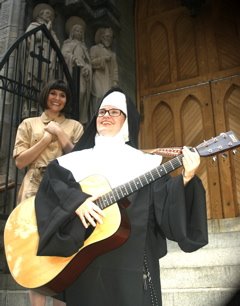 A good comedy is hard to find, so thank the (atheistic) heavens for this offering at the New York Musical Theater Festival. I actually first saw it last year at UCB, where it was performed by its two authors, Anthony King and Scott Brown, and I had such an unexpectedly good time (unexpected because I'm usually suspicious of shows with exclamation points in their titles) that I went back for seconds. It also helped that the NYMF production stars two superb actors I was keen to see—Jeremy Shamos (most recently of Trouble in Paradise) and Christopher Fitzgerald (Wicked, Saturday Night).
A good comedy is hard to find, so thank the (atheistic) heavens for this offering at the New York Musical Theater Festival. I actually first saw it last year at UCB, where it was performed by its two authors, Anthony King and Scott Brown, and I had such an unexpectedly good time (unexpected because I'm usually suspicious of shows with exclamation points in their titles) that I went back for seconds. It also helped that the NYMF production stars two superb actors I was keen to see—Jeremy Shamos (most recently of Trouble in Paradise) and Christopher Fitzgerald (Wicked, Saturday Night).Gutenberg! The Musical! isn't so much a proper musical as a play with songs. Since it's set up as a backers' audition, in which Bud Davenport and Doug Simon, the authors of the show within the show, try to lure Broadway producers, the bargain-basement production values are integrated in the premise: This is a show that must be done on the cheap. There's only a pianist, no sets, no costumes (baseball caps with characters' names written on them are as close as it gets) and almost no props (the press is a cardboard box).
So yeah, Gutenberg! is about putting on a show about Gutenberg, the inventor of the printing press; his love affair with a wench named Helvetica; and his run-ins with an antagonistic monk ("Monk"), an antisemitic flower girl and various town drunks. There's not much to it, but the songs are dead-on in their mimickry of a certain bleating pop-Broadway style and the actors switch between characters with deadly comic precision.
There are two more performances on Saturday. Go and see it for $20, before someone turns it into the next [title of show] and starts charging $60.







